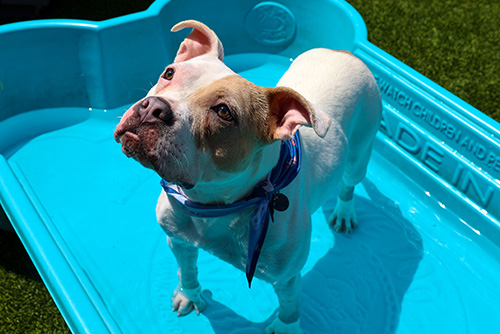Summer Safety Tips from Dr. Jared Cohen
Jul 20, 2023
Learn how to keep your pet safe while making the most of lovely weather with tips from Dr. Jared Cohen from Blum Animal Hospital, a Veterinary Centers of America (VCA) clinic.

Summer fun means extra ice cream, swimming with friends, and a lot of extra time spent outdoors with our furry loved ones. Whether it is longer walks than usual, running around at the dog park, or swimming at the lake, summer fun also brings summer perils. I previously got trapped by nice weather leading to problems for my dog. I was living in Rhode Island in the summer of 2012. My wife - also a veterinarian - and I took our two dogs for a walk. After only about ten minutes, our less than one year old wheaten terrier overheated and we had to stop at a gas station to ask to use cold water to cool him down before we ran into bigger problems. Accidents can certainly happen to anyone but planning ahead will help limit dangers and allow us all to enjoy the nice weather.
Here are some tips to allow us to take advantage of the best months of the year!
Avoid prolonged times in extreme heat: Dogs can cool themselves down. This can be accomplished in three different ways. They can sweat through their paw pads, exchange heat through their mouth by evaporation of moisture, and dilate blood vessels to cool down their blood. These cooling mechanisms are compromised on hot, humid days since their paws are touching hot ground and warm air does not allow for good heat exchange in the airway or along blood vessels in the skin. Temperatures tend to be lower in the early parts of the morning and later in the evening. Utilize these times of the day to take longer walks or allow your dog to run around. The strong, middle of the day sun creates higher temperatures. Bring a travel bowl and cold water to give when your dog is thirsty and offer at intervals to keep your pet well hydrated.
Know your dog: French bulldogs, English bulldogs, pugs, and the like are ever so cute. These breeds and many others, however, have an even more difficult time cooling down because of their anatomy. A more compromised airway and increased soft tissue in their mouth provide more sensitivity to heat effects. Overweight and obese dogs overheat easier and have a more difficult time cooling themselves. Remembering the unique traits of your dog will help tailor your time outside.
Keep your pets out of unattended cars: Our cars heat up to extreme temperatures very quickly. This can happen even with the windows cracked. The greenhouse effect of a car, even when parked in a shaded area, can lead to dangerously high body temperatures in as little as 15 minutes.
Take precautions with swimming: Cold water is an excellent way to keep yourself and your dog cool. Dogs are usually also excellent swimmers. Aspirating water can lead to pneumonia, there is a risk for drowning, and drinking dirty or contaminated water can lead to disease. Have fun in the water but stay alert to potential hazards.
How to tell if your dog may be in trouble: Some signs of overheating, heat exhaustion, or heat stroke are lethargy, difficulty breathing, abnormal color in the mouth, uncoordinated movements, and collapse. If you are concerned for development of overheating, you can provide active cooling with cool water, fan, air conditioning, shade and then seek medical care at your regular veterinarian or the nearest emergency clinic.
Additional tips for the summer months:
Be careful of toxins: Picnics, barbecues, and outdoor eating may be distracting or lead to dropped food such as grapes, raisins, and chocolate. Contact your veterinarian, a local emergency clinic or animal poison control if you are worried your pet ingested something toxic.
Fear of noises: Thunderstorms and fireworks stir up the summer sky. Loud noises are a common cause of stress and fear in pets. Providing background white noise, a safe, and a comfortable home environment help ease stress. Ask your veterinarian for advice on calming supplements or pharmaceuticals to limit the fear from the loud summer noises,
Limit the spread of disease: Use parasite prevention to limit spread of disease from fleas, ticks, and internal parasites. Ask your veterinarian for recommended prevention products.
